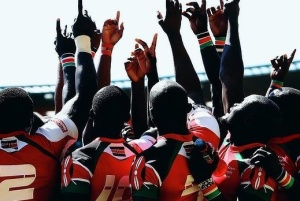
Kenya Sevens
Initial Report:
Steroids have been found in supplements given to players on Kenya’s Sevens team, according to a report that calls for disciplinary proceedings against head coach Paul Treu and five members of his staff.
The report by a task force set up by the government to investigate allegations of doping in Kenyan sport says there are “strong suggestions” that Treu of South Africa and his assistants have violated anti-doping rules after introducing the supplements to players.
There was “a concoction they [the coaches] gave players to drink at the beginning and end of training,” Moni Wekesa, the Chairman of the task force that investigated, told The Associated Press on Monday.
The report says the Kenyan players would stop taking the supplement a few days before competing.
rugby365
Wekesa said that tests performed on the supplements in January were positive for steroids, and the Kenya Rugby Union was immediately informed.
The KRU then handed over all the supplements and stopped giving them to players, Wekesa said.
The report said that Treu, who coached South Africa to the IRB Sevens Series title in 2009 and joined Kenya’s team as head coach last year, introduced new supplements to the team after arriving.
“Samples of these were retrieved from the union and subjected to laboratory analysis and were found to contain steroids,” the report, which has been made public, said.
Kenya is one of the core teams in the IRB Sevens World Series.
The report said Treu, strength and conditioning coach Graham Bentz, assistant coach Felix Ochieng, attack coach Zangqa Vuyo and conditioning coaches Geoffrey Kimani and Michael Owino should be “subjected to a disciplinary process” by regional anti-doping authorities.
It also suggested the nation’s 15-a-side rugby head coach and assistant coach face anti-doping disciplinary procedures.
The report has been sent to Kenya’s government, which commissioned the investigation, and the World Anti-Doping Agency’s regional office in Cape Town, South Africa, Wekesa said.
The Kenya Rugby Union and WADA’s office in South Africa didn’t immediately respond to telephone calls from the AP seeking comment.
The investigation by the task team initially focused on Kenya’s No. 1 sport, athletics, after German broadcaster ARD alleged widespread doping in the East African nation’s world-beating runners in a documentary aired in 2012.
Kenya came under pressure from WADA to investigate after a spike in positive doping tests by its athletes in recent years.
Wekesa’s report also found problems in anti-doping measures in Kenyan athletics, football and other sports.
“It came out that a lot of prohibited substances, some recreational, others sophisticated, are commonly abused across all sports,” the report said.
Kenya Rugby Union fire back:
Kenyan Rugby Union Chairman Mwangi Muthee has stated that the local Anti-Doping Taskforce committee set up by the Kenyan government cobbled together fallacious information.
Kenyan Sevens rugby coaches, including former BltizBokke coach Paul Treu, were alleged to have given players a drink at the beginning and end of training that contained steroids, this is according to Moni Wekesa, the Chairman of the task force that investigated.
However, the Kenya Government has now been challenged to state whether they had confidence in the qualification and integrity of members of a committee, headed by Wekesa, which is alleging that Kenyan sportsmen, among them Sevens players, have been using illegal food supplements.
Muthee said his organization was shocked to find press reports stating: “That, in the first place, it is illegal to use nutritional supplements.”
He said only one player had failed a doping test and that was way back in 2005.
He also added that the Sevens players, who play up to nine months in a year around the world, are tested by standards set by the World Anti Doping Agency (WADA) and the International Rugby Board and none had failed since 2005.
Muthee, said on Tuesday that there was no WADA approved Anti-Doping Agency in Kenya and a recent local Anti-Doping Taskforce committee assembled had ‘cobbled together fallacious information from familiar players of local sports politics wishing to score points for their own agenda.’
Muthee, who is currently out of the country, sent a brief message to the Kenyan Minister of Sports and Culture, Dr Hassan Wario on Tuesday.
“This is shoddy and misinformed work by Moni Wekesa [the committee’s chairman].
“Our game is unfairly tarnished beyond repair and some Kenyans are now liable to litigation because of the press publication of absolute rubbish and untruth.
“This exercise was a search for cheap publicity which it has achieved.”
When the Wekesa committee report was handed to Wario, its coverage on the online site of a local radio, Capital FM, sensationally headlined that current Kenya Sevens coach, Paul Treu, a former accolade winner with South Africa Sevens and his predecessor as Kenya Sevens coach Mike Friday, a former England coach now heading USA Sevens, had ‘put Kenya Sevens players on steroids’.
Friday’s instant retort to the Capital FM Sports was: “You [Capital FM Sports] will need very good lawyers if you don’t publicly retract and apologize for these lies.”
There has been much skepticism surrounding Wekesa and his qualifications with Athletics Kenya refusing to co-operate when the committee was formed in November last year.
Muthee has said: “It would take the Minister’s quick steps to repair the terrible damage caused by careless statements and wild allegations made by the Wekesa report.”
“There are questions and questions that Wekesa needs to answer.”